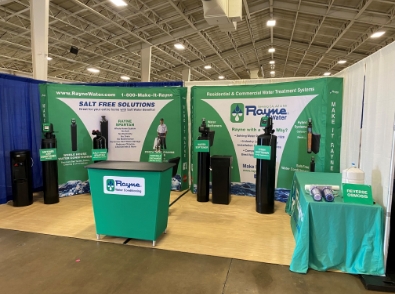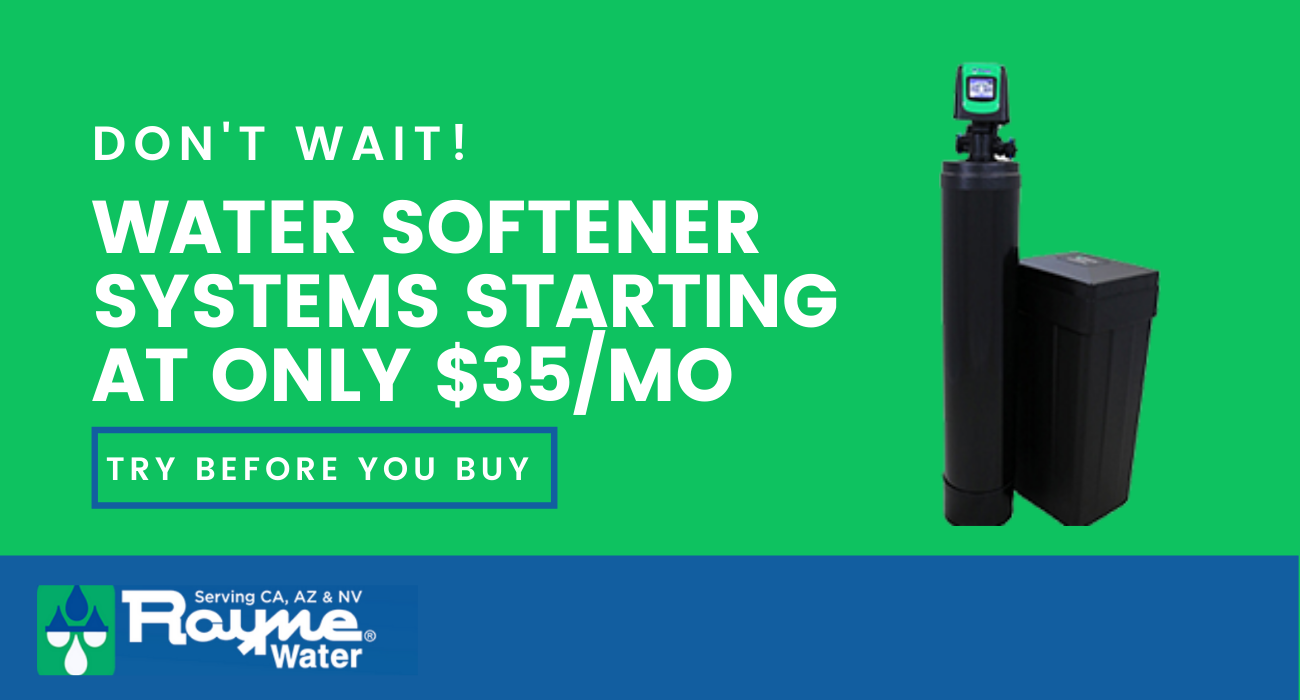If you have hard water, you probably want to know exactly how hard your water is.
To do so, you’ll have to test the mineral content of your drinking water. Understanding the mineral content of your water requires an introduction to water hardness levels, and then comparing your results with a water hardness scale.
In this article, you will learn about the difference between hard water vs. soft water and see how it affects your tap water at home.
What Is Water Hardness?

Water hardness is the concept used to communicate how much or how little dissolved minerals a sample of water contains.
Water is considered “hard” if it has relatively high levels of dissolved minerals. The most common minerals found are calcium and magnesium.
Water with very low levels of dissolved minerals is considered “soft”. To attain “soft” water, many people consider installing a water softener. So what is a water softener exactly? A home water softener system decreases the hardness of water, resulting in softer water.
What Is the Water Hardness Scale?
Now, you must know that drinking water isn’t considered either hard or soft. Rather, water hardness is a sliding scale that is used to tell exactly how hard water is.
Water can have only trace amounts of dissolved minerals, or be saturated in dissolved minerals, with water of varying degrees of hardness existing in between.
The water hardness scale is used to define the specific hardness of water. The scale can help you understand how hard your tap water is in relation to other water hardness readings, and to make an informed decision about whether you need a water softening solution in your home or business.
How to Use the Water Hardness Scale
In order to determine your water hardness, you have to take a sample of your water and measure its mineral content. You can use a test kit to measure the mineral and calcium hardness in your tap water.
The most common water hardness tests measure this mineral content in grains per gallon (GPG). Specifically, your hardness test will let you know the GPG of calcium carbonate that a sample of water contains.
This measurement is then applied to the water hardness level scale to determine how hard or soft your water is.
Here is the most common scale used to determine the dissolved mineral content of your water supply:
- Water is considered soft if it contains less than 1 GPG of dissolved minerals.
- Water is considered moderately hard if it contains between 1 – 7 GPG of dissolved minerals.
- Water is considered hard if it contains between 7 – 10 GPG of dissolved minerals.
- Water is considered very hard if it contains more than 10 GPG of dissolved minerals.
Factors Contributing to Water Hardness

So how do traces of dissolved calcium and magnesium end up in water? These minerals originate from natural geological formations and are further increased by human activities such as agriculture and industrial processes.
Natural Sources of Water Hardness
Various natural processes add to water hardness.
Water that leaks through mineral-rich formations like limestone or chalk picks up calcium and magnesium ions, which contribute to hardness. Water from underground aquifers also tends to be harder due to more contact with mineral deposits.
Additionally, surface waters like rivers, lakes, and streams collect minerals from their surroundings, further increasing hardness.
Anthropogenic Factors Contributing to Water Hardness
Agricultural activities, particularly the use of fertilizers, introduce extra calcium and magnesium into water bodies. Industrial discharges also add minerals and metals into water systems.
In urban settings, rainfall gathers pollutants from paved surfaces, such as oils and debris, which then flow into waterways, adding to water hardness and increasing the risk of pipe blockages.
Regional Variations in Water Hardness
Water hardness varies by region due to several factors:
- Geological Diversity: Different regions have different types of mineral deposits, affecting water hardness.
- Climate Impact: Warmer climates dissolve minerals more quickly, resulting in harder water, whereas cooler climates lead to higher mineral accumulations.
- Water Treatment Methods: Various water treatment processes can alter mineral concentrations, influencing overall hardness.
Why Is Water Hardness Important?

Understanding whether you have hard water, and how hard your water is, can help you take steps towards combating the impact of hard water.
But why bother finding out if you have hard water in the first place?
Most people want to know because hard water can have a number of detrimental effects to your water supply. Some of these you may already be familiar with, even if you didn’t know what caused them.
Here are some of the most common signs of hard water around the house:
- Mineral Deposits – When hard water comes in contact with surfaces around your house, it will leave behind mineral deposits. These mineral deposits are often whitish in appearance and can be difficult to remove. You’ll commonly see mineral deposits on surfaces and fixtures, on nozzles like your shower head, and on your dishes and cookware.
- Soap Scum – Soap scum is a whitish or yellowish substance that forms from a reaction by the minerals in hard water with soap. The result of this reaction is an insoluble precipitate that stubbornly coats surfaces it comes into contact with. Soap scum can serve as a breeding ground for mold and mildew and will return quickly despite frequent cleaning. Cleaning becomes more challenging due to soap scum and lingering mineral deposits.
- Brittle Hair – Hair that is washed in hard water is less strong than hair washed in soft water. The minerals in hard water penetrate the hair follicle, causing it to weaken over time. At the same time, washing your hair with shampoo and conditioner will be less effective because the minerals won’t allow them to penetrate the hair follicle. The mineral deposits will also weigh down hair, giving it a flat and dull appearance.
- Faded Clothing – Clothing washed in hard water will lose its color faster due to a buildup of mineral deposits on the fabric. The minerals left behind by hard water will also weaken the structure of the fabric with each washing, causing it to become more brittle and wear out more quickly.
Addressing Hard Water Concerns and Effective Solutions

So far, we’ve established that dealing with hard water can be a hassle. It’s notorious for causing stubborn mineral deposits, reducing the efficiency of household appliances, and causing skin and hair irritation. It’s important to catch these issues early and explore effective solutions like water softeners.
Exploring Effective Solutions for Hard Water Problems
There are a few approaches to mitigating the effects of hard water:
- Water Softeners: These devices use ion exchange to remove the minerals that cause water hardness, effectively softening your water. However, they require regular maintenance and increase sodium levels in your water.
- Salt-Free Water Conditioners: These conditioners prevent scale without adding sodium to the water, using methods like template-assisted crystallization. Ideal for those on low-sodium diets.
Test your water today and eliminate hard water issues.

Ultimately, by understanding your options and the impacts of hard water, you can choose the best solution to keep your home running smoothly and your skin and hair looking their best.
Rayne has delivered top-notch water softener & drinking system solutions since 1928. Our water softening systems tackle hard water and start saving you money from day one. Get started with us today!
Sources:
- https://water.usgs.gov/owq/hardness-alkalinity.html#hardness
- https://www.wqa.org/learn-about-water/perceptible-issues/scale-deposits
- Ungvarsky, Janine. “Hard Water.” Salem Press Encyclopedia of Science, 2018.
- Luqman, Muhammad Waqas, Muhammad Haris Ramzan, Usama Javaid, Roshan Ali, Muhammad Shoaib, and Muhammad Ayyas Luqman. “To Evaluate and Compare Changes in Baseline Strength of Hairs after Treating Them with Deionized Water and Hard Water and Its Role in Hair Breakage.” International Journal of Trichology 10, no. 3 (May 2018): 113–17.
FAQs
What is the water hardness scale?
The water hardness scale measures the concentration of minerals, primarily calcium and magnesium ions, in water. It helps classify water as hard or soft based on the level of mineral content.
What is hard water?
Hard water is water that contains high levels of dissolved minerals, such as calcium and magnesium. These minerals can lead to scale buildup in pipes and appliances, reducing their efficiency.
What problems can hard water cause?
Hard water causes scale buildup in pipes and appliances, reducing their efficiency and lifespan. It also leads to soap scum on surfaces, skin irritation, and dull hair.
How can I soften hard water?
Hard water is softened using water softening systems such as ion exchange softeners, salt-free conditioners, or electronic descalers. These systems remove or prevent the buildup of minerals in water.






